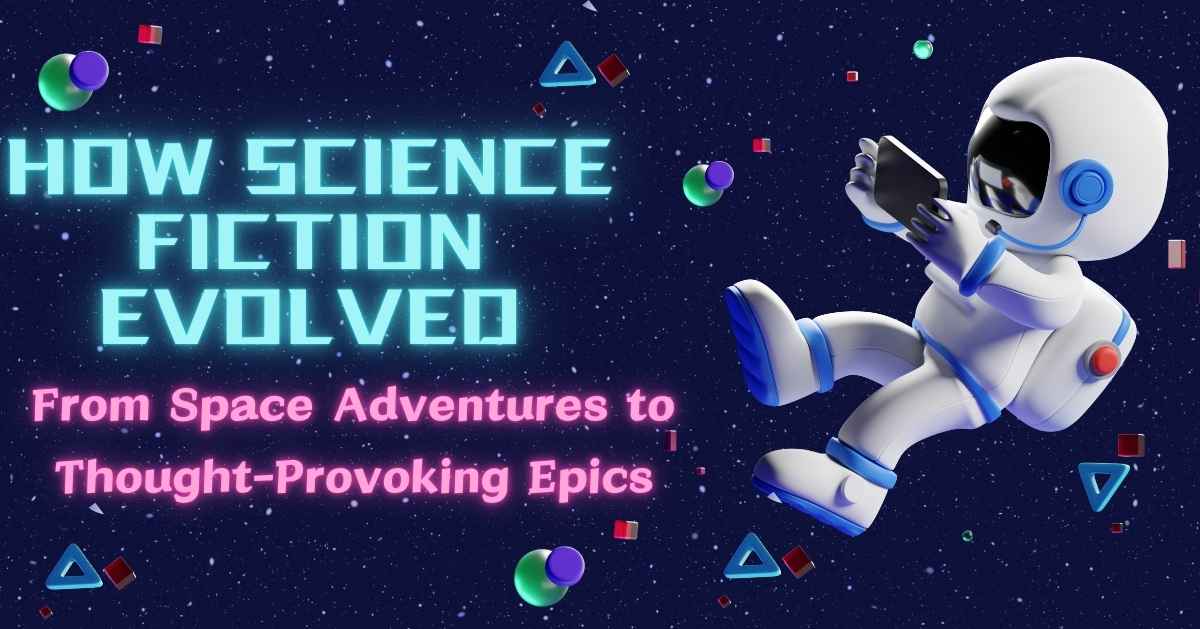Science fiction (sci-fi) has captivated audiences for centuries, transporting readers and viewers to distant worlds, exploring futuristic technologies, and grappling with profound questions about humanity. How Science Fiction Evolved From its humble beginnings as escapist space adventures to its current role as a platform for exploring societal and philosophical issues, sci-fi has undergone a remarkable evolution. This article delves into the journey of the genre, tracing its transformation from pulp fiction to thought-provoking epics.
The Dawn of Science Fiction: A Sense of Wonder
Science fiction’s origins can be traced back to the 19th century with works such as Mary Shelley’s Frankenstein (1818), which explored the consequences of scientific ambition, and Jules Verne’s 20,000 Leagues Under the Sea (1870), which combined adventure with speculative technology. These early works set the stage for the genre by blending scientific curiosity with imaginative storytelling. The early 20th century saw the rise of “pulp” science fiction, characterized by magazines like Amazing Stories (founded in 1926). Writers such as H.G. Wells and Edgar Rice Burroughs captured readers’ imaginations with tales of space exploration, alien encounters, and advanced technologies. These stories were often escapist, offering thrilling adventures that celebrated the wonders of science and the cosmos.
The Golden Age: Optimism and Exploration
The 1930s and 1940s, often referred to as the “Golden Age of Science Fiction,” marked a period of rapid expansion for the genre. Visionaries like Isaac Asimov, Arthur C. Clarke, and Robert A. Heinlein emerged, producing stories that combined scientific plausibility with compelling narratives. Works such as Asimov’s Foundation series and Clarke’s Childhood’s End explored themes of progress, human ingenuity, and the challenges of a technologically advanced future. During this era, sci-fi reflected the optimism of the post-World War II period. The space race and advances in technology fueled the public’s fascination with exploration and innovation. Stories often revolved around heroic astronauts, pioneering scientists, and the limitless possibilities of space. While these tales celebrated human achievement, they also began to hint at deeper philosophical questions about humanity’s place in the universe.
The New Wave: A Shift Toward Introspection
The 1960s and 1970s brought significant cultural and social upheaval, and science fiction evolved to reflect these changes. This period, known as the “New Wave,” saw a shift away from traditional space adventures toward more experimental and introspective storytelling. Writers such as Philip K. Dick, Ursula K. Le Guin, and J.G. Ballard pushed the boundaries of the genre, exploring themes of identity, consciousness, and societal structures.
The Rise of Dystopia: Warnings for the Future
As the late 20th century unfolded, the genre increasingly turned toward dystopian themes. Stories and the movie genere began to focus on the darker aspects of technological and societal advancement, highlighting potential dangers such as authoritarian regimes, environmental collapse, and the erosion of personal freedoms. Cyberpunk, a subgenre that emerged in the 1980s, exemplified this trend. Pioneered by writers like William Gibson (Neuromancer, 1984) and Bruce Sterling, cyberpunk depicted gritty, high-tech worlds where corporate power overshadowed governments, and humanity grappled with the consequences of artificial intelligence and cybernetics.
Films like Blade Runner (1982), based on Philip K. Dick’s work, and The Matrix (1999) further popularized dystopian science fiction, raising questions about free will, reality, and the impact of technology on society.
The Modern Era: Science Fiction as Social Commentary
In the 21st century, science fiction has solidified its role as a medium for exploring social, political, and ethical issues. Writers and filmmakers continue to push the boundaries of the genre, using it to address topics such as climate change, systemic inequality, and the ethical implications of emerging technologies.
Works like Margaret Atwood’s The Handmaid’s Tale (adapted into a successful television series) and Kim Stanley Robinson’s Ministry for the Future tackle pressing environmental and societal challenges. Similarly, shows like Black Mirror delve into the unintended consequences of technological innovation, offering cautionary tales about our increasingly interconnected world.
Science Fiction on Screen: Blockbusters and Prestige Television
The visual medium has played a crucial role in the evolution of science fiction. Early films like Metropolis (1927) and 2001: A Space Odyssey (1968) set the standard for cinematic sci-fi, blending stunning visuals with thought-provoking narratives. Streaming platforms have further revolutionized sci-fi storytelling, allowing for complex, serialized narratives that delve into character development and world-building. Shows like The Mandalorian and Stranger Things demonstrate the genre’s ability to balance spectacle with emotional depth, appealing to both mainstream audiences and dedicated fans.
The Future of Science Fiction
As we look to the future, How Science Fiction Evolved and continues to evolve, adapting to new technologies and cultural shifts. The rise of virtual reality, artificial intelligence, and space exploration provides fertile ground for new stories and ideas. At the same time, the genre’s increasing focus on diversity and inclusivity ensures that it remains relevant and reflective of a global audience.
Conclusion
Science fiction’s journey from space adventures to thought-provoking epics reflects the changing concerns and aspirations of society. What began as escapist entertainment has evolved into a powerful tool for examining complex issues, inspiring innovation, and fostering empathy. As the genre continues to grow, it serves as both a mirror and a guide, challenging us to imagine a better future while confronting the challenges of the present. Whether through novels, films, or television, sci-fi remains a vital and ever-evolving force in the landscape of storytelling.
FAQ’s
Science fiction evolved by shifting from action-driven tales to stories that delve into societal, ethical, and existential themes, reflecting the changing world.
Works like Isaac Asimov’s Foundation, Ray Bradbury’s Fahrenheit 451, and Philip K. Dick’s Do Androids Dream of Electric Sheep? helped define this transformation.
Modern science fiction tackles contemporary issues such as AI, climate change, and identity, using speculative narratives to explore ethical and societal implications.

